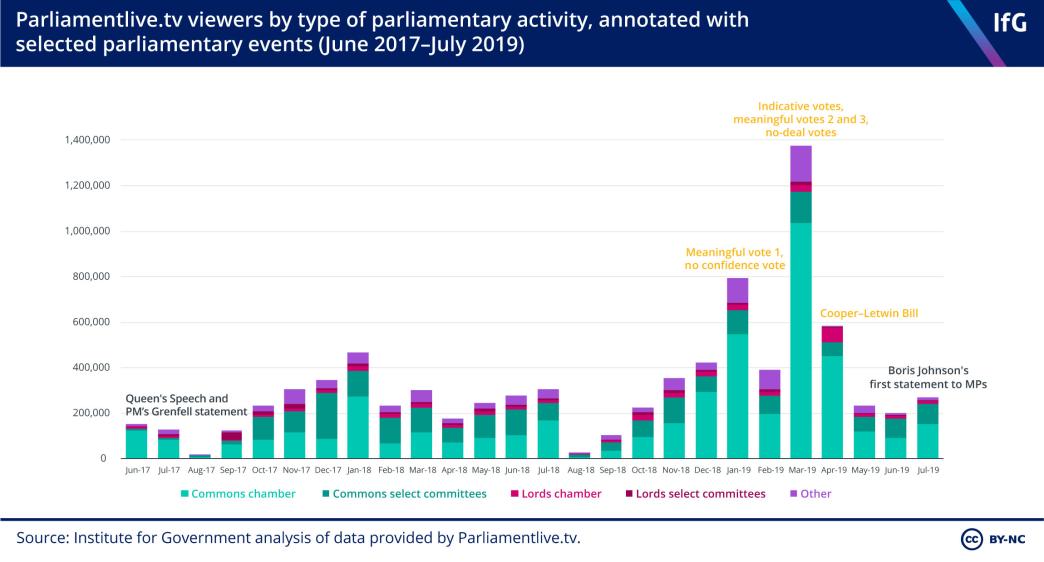Primetime Brexit drama doesn’t tell the whole story for Parliament’s TV audiences
The fireworks on display in the House of Commons risk giving a distorted impression of parliamentary effectiveness.
With more people than ever before tuning in to watch events unfold in the Palace of Westminster, Joe Marshall asks whether the fireworks on display risk giving a distorted impression of parliamentary effectiveness.
As the Institute for Government’s latest report on parliamentary activity shows, record numbers of people are watching events unfold in Parliament on TV, via clips shared on social media and through Parliament’s dedicated website (Parliamentlive.tv). Between June 2017 and July 2019, the number of average daily viewers tuning into Parliamentlive.tv increased by a huge 237%. In January, BBC Parliament briefly out-rated MTV, and a record 1.5 million people watched BBC Parliament on the day that MPs voted to take control of the Commons agenda and pass a bill to prevent no deal in October.
While this new-found passion for Parliamentary activity makes a welcome change from familiar complaints of political apathy and disengagement, viewers are tuning in when Parliament is at its most volatile, fraught and – sometimes – dysfunctional. There is, as a result, a risk that these dramatic pictures are in fact blurring the bigger picture.

Brexit has attracted most attention – and a global TV audience
The increase in Parliamentlive.tv viewer numbers was most stark in the first few months of 2019. Significant spikes during January and March 2019 followed a succession of heated Brexit debates, prime ministerial statements and knife-edge votes played out on the floor of the Commons.
While the Brexit impasse is most keenly felt in the UK, it has an international reach; 40% of the Parliamentlive.tv audience in the first three months of this year came from outside the UK, up from 18% for the same period in 2018.
Amid the drama over the last week, international visitors to the Parliamentlive.tv website made up more than half of the total, with Germany accounting for more than one in ten visitors. It’s a sign of the exceptional nature of recent events in Parliament that British MPs have become household names across Europe.
TV audience numbers have spiked at moments of high political drama
Many of the high-octane events during the 2017-19 session have coincided with examples of parliamentary procedure and constitutional practice coming under pressure. These include unprecedented attempts by MPs to take control of the Commons agenda and pass legislation against the government’s wishes, controversial interpretations of parliamentary rules by the Speaker, and the government’s success in a vote of no confidence despite lacking support among MPs for its key policy – a state of affairs that would have traditionally precipitated its fall from office.
Such pressures do not mean the system is broken. In fact, they could show that the constitution is working, adapting to the political pressures of the day. But they do clearly show that these are not normal times in Parliament.
Political drama sees audience figures rise but risks giving a distorted view of Parliament
In many ways the increase in public engagement is a good thing, helping raise awareness of how Parliament works and its central role in our political system. As the former Leader of the House of Commons said, ‘we might be facing a very challenging time in Parliament, but the silver lining is a huge increase in democratic participation.’
However, there is a risk that the draw of high drama leads to disproportionate attention being paid when parliamentary procedure is under strain – rather than on the day to day activity that continues to take up the majority of time in Parliament. This could lead to the perception that Parliament is more adversarial and less functional than is really the case, when evidence – notably from select committee work and backbench activity – shows that, in many areas, Parliament continues to effectively fulfil its functions of holding government to account and representing the public.
Increased public engagement in Parliament is to be welcomed. But with recent polling showing that 74% of the public agree that “the UK political system is currently not fit for purpose”, and only 6% agreeing that UK politicians “understand people like me”, the next challenge is to communicate Parliament’s value and effectiveness as an institution – despite the headlines to the contrary.
- Supporting document
- parliamentary-monitor-2019-snapshot-WEB.pdf (PDF, 3.36 MB)
- Keywords
- Parliamentary scrutiny
- Legislature
- House of Commons
- Publisher
- Institute for Government